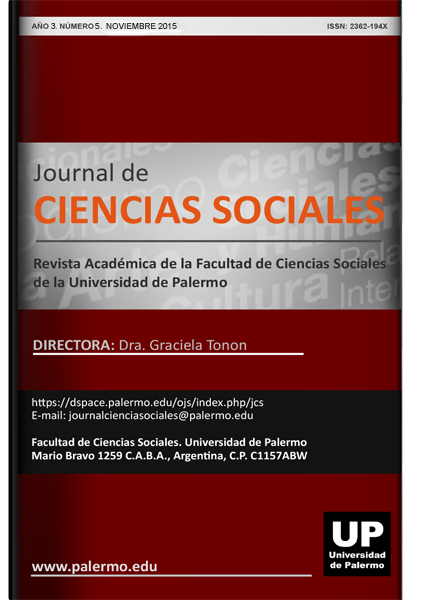Cuestiones en torno a la filosofía de la India. Tendencias académicas en las universidades de Argentina y dilemas (meta)filosóficos
Resumen
En el presente trabajo nos proponemos abordar diferentes cuestiones relativas a la filosofía de la India. Examinamos, en primer término, la situación actual del área en las universidades argentinas y, específicamente, en el currículo de las licenciaturas en filosofía dictadas en nuestro país. Relevamos, con esta finalidad, el programa de estudios de las treinta y dos carreras de grado en filosofía ofrecidas por las universidades públicas y privadas nacionales. En segundo término, brindamos una concisa discusión de la bibliografía especializada y actualizada respecto del dilema acerca de la existencia o no de una filosofía de la India. En relación con esta discusión, abordamos algunos ejemplos de autores que procuran desarticular aquellas posiciones arraigadas y centenarias que sostienen que no hay filosofía en India. Ofrecemos, asimismo, la visión propuesta por los especialistas contemporáneos en el pensamiento indio que defiende la presencia de la filosofía en la cultura de la India clásica y que argumenta a partir de un conocimiento sistemático y metodológicamente honesto acerca de esta tradición. Nuestra investigación procura poner de manifiesto, pues, que el abordaje del dilema (meta)filosófico acerca de si hay o no filosofía en la India requiere e implica una tradición de investigación (auto)crítica especializada en el área y que en nuestro país tal tradición se encuentra en un estado embrionario.
Descargas
Citas
BARUA, A. (2013). “Is there 'philosophy' in India? An Exercise in Meta-philosophy.” En Studies in Humanities and Social Sciences, Vol 20, No 1.
BRONKHORST, J. (1998) “Why is there Philosophy in India?”. Sixth Gonda Lecture, held on 13 November on the premises of the Royal Netherlands Academy of Arts and Sciences. Amsterdam.
CHAKRABARTI, A. (1999). “Rationality in Indian Philosophy”. En DEUTSCH, E. and BONTEKOE, R. (eds.). A Companion to World Philosophies. Oxford, Blackwell, pp 259-278.
DEUTSCH, E. and BONTEKOE, R. eds. (1999). A Companion to World Philosophies. Oxford, Blackwell
FLOOD, G. ed. (2003). The Blackwell Companion to Hinduism. Oxford, Blackwell Publishing.
FRAZIER, J. (2011). “Reason and Rationality in Hindu Studies”. En The Journal of Hindu Studies, vol. 4, pp. 1–11.
FRESCHI, E. (2014) PhD programs in Indian Philosophy. Part 2: Europe. Posted on 26 March 2014. http://indianphilosophyblog.org/2014/03/26/phd-programs-in-indian-philosophy-part-2-europe/
GANERI, J. (2001). Philosophy in Classical India. The proper work of reason. London, Routledge.
GUTHRIE, W. K. (1969). A History of Greek Philosophy. Volume II. The presocratic tradicion from Parmenides to Democritus. Cambridge, Cambridge University Press.
HALBFASS, W. (1990). India and Europe: an essay in philosophical understanding. Albany, SUNY Press.
HART, K. (1989). The Trespass of the Sign: Deconstruction, Theology and Philosophy. Cambridge, Cambridge University Press.
KING, R. (1999). Orientalism and Religion. Postcolonial theory, India and ‘the mystic East’. London, Routledge.
KRISHNA, D. (1991). Indian Philosophy. A counter perspective. Delhi, Oxford University Press.
LAWRENCE, D. P. (2011). “Hindu Philosophical Traditions”. En FRAZIER, J. (ed.). The Continuum Companion to Hindu Studies. London & New York, Continuum International Publishing Group, pp. 137-151.
MATILAL, B. K. –au.-, TIWARI, H. y GANERI, J. –eds.- (1998). The Character of Logic in India. New York. SUNY Press.
MOHANTY, J. N. (1999). “A History of Indian Philosophy”. En DEUTSCH, E. And BONTEKOE, R. (eds.). A Companion to World Philosophies. Oxford, Blackwell, pp 24-48.
NICHOLSON, A. (2014) The Philosophical Rasika Report: Listings of Ph.D. Programs in Indian Philosophy. Part I: North America: Posted on 17 March 2014. http://indianphilosophyblog.org/2014/03/17/the-philosophical-rasika-report-listings-of-ph-d-programs-in-indian-philosophy-part-i-north-america/
POLLOCK, Sh. (2006). The Language of the Gods in the World of Men.Sanskrit, Culture, and Power in Premodern India. Berkeley and Los Angeles, University of California Press.
RAM-PRASAD, C. (2003). “Contemporary Political Hinduism”. En FLOOD, G. (ed.). The Blackwell Companion to Hinduism. Oxford, Blackwell Publishing, pp. 527-550.
SRINIVASA RAO (2007). “‘Subordinate’ or ‘Supreme’? The Nature of Reason in India and the West”. En Beyond Orientalism. The Work of Wilhelm Halbfass and its Impact on Indian and Cross-Cultural Studies. Delhi, Motilal Banarsidass Publishers Private Limited, Pp.: 205-220.
STAAL, F. (2003). “The Indian Science of Language”. En FLOOD, G. (ed.). The Blackwell Companion to Hinduism. Oxford, Blackwell Publishing, pp. 348-359.
STAAL, F. “Is there Philosophy in Asia”. En Interpreting Across Boundaries: New Essays in Comparative Philosophy. New Jersey, Princeton University Press, Pp. 203-229.
TOLA, F. y DRAGONETTI, C. (2002). “What Indian Philosophy owes to Hegel”. En Annals of the Bhandarkar Oriental Research Institute, vol. LXXXIII, pp. 1-36.
TOLA, F. Y DRAGONETTI, C. (2008). Filosofía de la India. Del Veda al Vedanta. El sistema Samkhya. El mito de la oposición entre “pensamiento” indio y “filosofía” occidental. Barcelona, Kairós.
WUJASTYK, D. (2003). “The Science of Medicine”. En FLOOD, G. (ed.). The Blackwell Companion to Hinduism. Oxford, Blackwell Publishing, pp. 393-409.
WUJASTYK, D. (2009). “Post-Classical Indian Traditions of Medical Debate and Argumentation. The Rogärogaväda of Véreçvara”. En eJournal of Indian Medicine 3, pp. 67-81.
Los autores conservan los derechos sobre su obra garantizando a esta revista el derecho de primera publicación, comprometiéndose a citar el Journal de Ciencias Sociales como referencia de la publicación original.
Los trabajos publicados en el Journal se publican bajo los términos que se indican en la Licencia de Creative Commons con la Atribución 4.0 Internacional (CC BY 4.0).




























